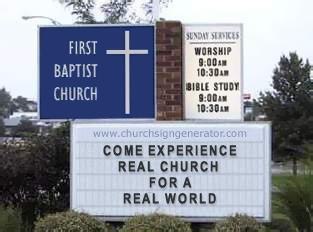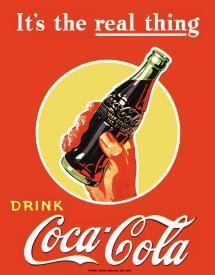|
LIQUIDTHINKING IS: Stephen Zedler Mark Riddle Jimmy Doyle Andy Mullins Current Soundtrack RSS Feed
LINKS Add Us To Your Blogroll! WHAT WE'RE READING ARCHIVES CLASSIC POSTS Thoughts On Leadership... Frustration The Church™ Is Dead PrePositionalism Prepositionalism Primer Christian Condoms Miracles |
Monday, February 28, 2005
Advertising   Experience Adds Life: Coke's Experiential Approach Included on every list of top 20th-century brands, COCA-COLA is welcoming the 21st century with a new advertising and marketing campaign that aims to build even stronger consumer connections - experientially. While its centerpiece is the recently unveiled theme - "Coca-Cola. Enjoy." - the company is also launching a massive promotional effort to update its signature contour green glass bottle. The instantly recognizable icon will build nostalgic resonance in the new ads, but executives also talk about the importance of the classic bottle as part of the brand's "total sensory experience." According to outgoing CMO Charlie Frenette, "When that bottle is in someone's hands it brings together the physical and emotional connection for the brand... We need to use the packaging in an experiential way to reawaken people." 360į Newsletter ©2005, Jack Morton Worldwide Tuesday, February 22, 2005
My Fortune Cookie  From my dinner tonight "We would often be sorry if our wishes came true." My daughter's fortune cookie from dinner "You will soon receive an unusual gift." Coincidence? You decide. Wednesday, February 16, 2005
Transparency A while back ago, I commented on a desire for more transparency in the body of Christ. But right now I'm thanking God for secrets. The thought of what would happen if people had access to the hidden thoughts of those around them is frightening and hurtful. Tuesday, February 15, 2005
 Introducing Mikayla Riddle Hey...It's a new addition to the Riddle clan. They've now got a full house...3 guys, and 2 girls. Click here for pics. Sunday, February 13, 2005
What the Bleep Do We Know? I saw the movie this weekend. Interesting. I'll post a review later this week. Saturday, February 12, 2005
Jimmy's Worship Songs, vol 1 Here are some songs that make me think of God.         http://phobos.apple.com/WebObjects/MZStore.woa/wa/viewPublishedPlaylist?id=236438 Sunday, February 06, 2005
Stories I Tell (yet another Toad the Wet Sprocket throwback) Donít give me answers for I would refuse Yes is a word for which I have no use And I wasnít looking for heaven or hell Just someone to listen to stories I tell Now what is a blessing and what is a dream? Caught between portraits and noneís what it seems And why is it people expect thereís a change, When I feel Iím a part of something I canít see? I feel the same Now donít ask me questions or I will retreat Fame is a cancer and ego itís seed Now I wasnít looking for heaven or hell Just someone to listen to stories I tell Do we ever wonder? And do you ever care... Subtle salvation in poems we know Hiding our heads in a shadow of home Now I wasnít looking for wreaths or for bells Just someone to listen to stories I tell Stories I tell Living Myth, Part 2 The problem we face currently in Christianity is that we are no longer mythic...we are no longer about a story. As mentioned in my previous post, people need a story to give meaning to their lives. The typical Christian approach to the Gospel, to Scripture, to Social Justice, etc. doesn't have any sort of story to it at all. We present principles to live by as if they are cold facts from some data sheet. Every once in a while we may throw in some pithy story for emphasis, but the general focus is on informational life modification concepts. We don't even begin to touch on the creativity, imagination, and meaning that a good story sparks. I loved the movie Big Fish. Maybe for the same reason that I love a good funeral. Typical funerals are much like a typical church service. Someone stands behind the pulpit and gives a talk dotted with facts and a few humorous stories about the deceased. Many times the person giving the talk doesn't even know the person they're talking about. Good funerals are inspiring. It's where the deceased are made alive again by the stories told about them...stories that we bring into ourselves and somehow are challenged to live ourselves. Good funerals are mythic...where the deceased becomes something more than we ever aknowledged while they were with us (in a good way). It's not the details, it's the story-telling that makes the difference. But we've lost the imagination and creativity that it takes to be good story tellers because we're so focused on those danged details. It's like we're astronauts who have just touched the moon, but all we can talk about when we get back is the temperature, the stats on gravity, the approximate time we've been there, etc. I recently had a class where I expressed to the students that the Bible is a wonderful book because it leaves so many of the details out. It leaves room for us to create, to imagine what the unmentioned was like: where was Joseph, what did Jesus feel, how did it smell, etc. I shared with them some of my recent posts concerning Jesus and his thoughts. It is interesting how students responded. Some of the Christian students responded with "how do you know you're not making things up?" I said, "I am making things up." They said, "How do you know you're right?" And maybe that's a huge part of the problem, the desire to be right. Interestingly, some of my non-Christian students were encouraged by the discussion. A dead book now had the possibility of becoming a living word. One of my students even made a point to literally grab me after class and say with some amount of excitement, "This makes sense to me." We must get back to learning the art of being story tellers. As individuals and communities of believers we need to have a sense of the mythical. It has always drawn people in...whether it be the Greek tragedies, the Cantebury tales, Lord of the Rings, or the story of Stories itself. We cannot continue to (in Elderidge's words) "dissect the cat until no living, breathing cat remains". Even in the Emergent circles where much of this has been discussed from the beginning, it surprises me to see how little we have focused on stories and how much we have focused on style, technique, and the details. May God give us the grace to tell our story as if it is His own, and His as if it is ours...and may they be full of myth. Saturday, February 05, 2005
Signs of the End I'm no chicken little. I don't care for the theology of "let's get out of here". And Tim LaHaye aside, stuff like this makes me wonder if we're not nearing the end. Some day, it might get very difficult to show love to another person. Living Myth Lately I've been exploring with my students (seniors in high school) the idea of the myth...the stories that give meaning to life. Joseph Campbell really got this idea going in popular culture in the 80's and recently John Elderidge has (strangely) introduced the idea into the Christian culture (I'm sure it could be argued that C.S. Lewis did that somewhat as well). We all live by myths...both cultural and personal. Unfortunately, in Christian culture we have all but forsaken the idea of myth. As a matter of fact, it has become synonymous with nothing more than a fictional story. In a large section of American Christianity, one had better not dare to call the Christian story a mythical story for fear of being a herectic who says the whole thing is bunk. But a myth isn't just a true story, it's a truth story...it goes deeper than events to the meaning that we crave. We all have stories that we tell to ourselves that give life purpose and meaning. Sometimes those stories are grounded in a common perception of reality and sometimes they are not...but always they are not the reality in itself but interpretations that make sense to us. Even our own memories of our childhood, high school, even last week are not memories of actual events, but our interpretations of those events. The stories we tell ourselves and others about those past events are not the events themselves. Psychologists doing a survey of people who had visited Disney World showed that 35% steadfastly believed that they had shaken the hands of Bugs Bunny while there...even though Bugs Bunny isn't a Disney character. Reality and memory isn't what it seems...it's our version. In the past two years I have found that the vast majority of my students (whether religious or not) hold not just a belief in God, but a need for God to be real. When I asked them why, the top answer was always something along the lines of: "If God doesn't exist...if there's not something else out there, then none of this makes sense." They see an intrinisic connection between God and meaning. They almost need the meaning more than God, it's just that they can't find the meaning in and of themselves. One student was honest enough to say it just like that, "I believe in God because I need him to exist to make sense of things. Otherwise everything is too overwhelming." So, in light of this emphasis on the need for meaning, the next question I posed to my students was, "What is your myth? What is the story you believe about yourself that gives you meaning?" Then, an interesting switch took place. These students so emphatic on meaning suddenly slipped into an apathy...a view that meaning couldn't be known. That purpose is always something "out there" or "in the future". I explained that they already had stories that gave meaning to their lives right now...whether it was the jock who believed he was a stud, or the girl who wanted to lose 15 more pounds...they all had stories or visions of who they are that gives them some sense of purpose and meaning. Which often led to great discussions about how these stories get created. It was also intereting to find that most of my students (again, seniors in high school) all feel that they are destined to do something great...or rather to do something greatly. I suggested that perhaps we create these stories and in turn the stories create us. We tend to think that the events in our lives create us, but really it's the myth we create around those events that make us who we are. We live out the story we tell ourselves. For the Christian the key to spiritual and mental health is to somehow find an understanding of what God's story about us is and to align our story with that one. It's all very subjective, but maybe the subjective nature of it allows us to be co-creators with God of our very selves. And it's not just true for individuals, but for communities as well. So, what is your myth? What is the story you tell and live about yourself? Wednesday, February 02, 2005
 Concerning Emergent... Bob Carlton has spoken words that I've felt concerning Emergent. Check it here. Tuesday, February 01, 2005
HOME |
|
 Jimmy Doyle is a dad, husband,
teacher, friend, and other things. Currently he's just trying to figure out what it means to follow Christ and be in community with others. He enjoys having conversations with fellow pilgrims on the journey.
Jimmy Doyle is a dad, husband,
teacher, friend, and other things. Currently he's just trying to figure out what it means to follow Christ and be in community with others. He enjoys having conversations with fellow pilgrims on the journey.